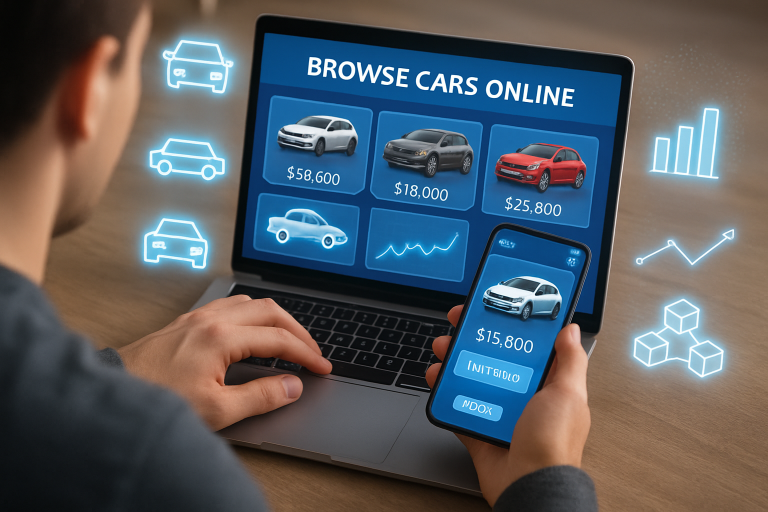The car-buying landscape is undergoing a digital revolution. Driven by cutting-edge technologies, the automotive industry is transforming traditional purchase processes into experiences defined by convenience, personalization, and transparency. Today, buyers can compare vehicles, explore financing options, and even learn more about the latest models—all from their computers or smartphones, thereby sidestepping much of the time and stress once associated with dealership visits.
From online showrooms and artificial intelligence to seamless digital paperwork and revolutionary blockchain solutions, innovation is making car buying more user-friendly than ever. Embracing these trends not only opens up broader vehicle choices but also significantly enhances the decision-making process for both consumers and dealers.
Virtual Showrooms and Augmented Reality
Virtual reality (VR) and augmented reality (AR) have revolutionized how consumers discover and interact with vehicles. Immersive technologies, such as Fiat’s Metaverse Store, let users explore, customize, and compare vehicles with lifelike detail, all without setting foot in a dealership. As highlighted by CBT News, many dealerships are now exploring virtual showrooms as a strategic move to stay competitive in an increasingly digital marketplace. With these tools, shoppers can experience interior layouts, paint options, and feature sets in 3D, helping them make informed choices from anywhere. This digital approach also provides consumers with access to a much wider vehicle selection, breaking traditional geographic limitations and creating an inclusive experience for all types of buyers.
Artificial Intelligence in Customer Service
AI-powered assistants and chatbots have quickly become an integral part of the modern car-buying process. These intelligent systems answer questions around the clock, recommend vehicles based on individual tastes, and schedule appointments or test drives. As artificial intelligence continues to evolve, interactions are becoming more natural and deeply personalized. By analyzing browsing behaviors, search queries, and past purchases, AI tailors recommendations, thereby improving customer satisfaction and streamlining the decision-making process.
Online Financing and Digital Paperwork
The digital transformation of car financing is eliminating piles of paperwork and making the approval process more transparent and efficient. Buyers can evaluate different financing offers using intuitive loan calculators, fill out online applications for pre-approvals, and sign documents electronically. This means less time spent haggling in dealership offices and more clarity around loan terms, interest rates, and monthly payments. With finance specialists and digital customer support always within reach, consumers are now better positioned to secure deals that fit their budgets and needs.
Vehicle Subscription Services
Emerging vehicle subscription services are appealing to a growing segment of buyers who seek greater flexibility in accessing transportation. For a fixed monthly fee, subscribers can drive a variety of new or nearly new vehicles, with insurance, maintenance, and roadside assistance often included. This model lets drivers periodically switch cars, selecting one that best suits their current lifestyle without the lasting obligations of ownership or leasing. It’s an especially attractive solution for urban residents, frequent travelers, or anyone interested in testing different makes and models over time.
Blockchain for Secure Transactions
Security and transparency in car buying are being elevated by blockchain technology. Blockchain’s decentralized and tamper-resistant system stores critical details, such as title transfers, service history, and mileage, in a permanent digital ledger. This aims to reduce fraud, prevent odometer tampering, and streamline ownership transitions, giving both buyers and sellers greater peace of mind. Additionally, blockchain automates complex transactions, such as financing and insurance, making them faster and more reliable, without the need for third-party intermediaries.

Autonomous Vehicles and Their Impact
Autonomous vehicles (AVs) are poised to reshape personal transportation and car ownership models profoundly. As advanced driver-assistance features and fully self-driving capabilities become mainstream in vehicles, the need for individual car ownership may diminish. Instead, shared mobility—where consumers use ride-hailing or vehicle-sharing—could become the norm, particularly in urban centers. This transition will impact everything from dealership operations to insurance models, further solidifying technology’s central role in the car-buying narrative.
The Role of Big Data and Analytics
Big data is a driving force behind modern automotive marketing and sales. By collecting and analyzing customer data, dealerships and manufacturers can better anticipate consumer needs, fine-tune inventories, and deliver highly targeted offers. Data analytics enable the prediction of future trends, optimization of pricing strategies, and delivery of tailored experiences through digital channels. This level of precision not only creates more satisfying customer journeys but also increases efficiency across sales teams and dealership networks.
Future Trends in Car Buying
Looking ahead, we can expect to see even deeper integration of AI, AR, and digital services throughout the car purchase cycle. Remote test drives, end-to-end car buying platforms, and immersive configurators will become increasingly widespread, as will environmentally conscious options powered by electric and autonomous vehicles. The ongoing evolution of these technologies promises more competitive pricing, greater accessibility, and truly individualized buying journeys for all consumers.
In summary, technology has fundamentally transformed the way people buy cars, empowering consumers with unprecedented knowledge, efficiencies, and choice. Staying ahead of these trends will help buyers and industry professionals fully capitalize on the innovations shaping tomorrow’s automotive marketplace.
Embracing a New Automotive Era
The digital transformation of the car buying journey is no longer a future concept—it’s today’s reality. From exploring vehicles in immersive virtual showrooms to securing financing online with a few clicks, technology has streamlined and enhanced nearly every step of the process. Buyers are no longer bound by geography, office hours, or stacks of paperwork, giving them the freedom to shop on their terms.
As innovation continues to reshape the industry, both consumers and dealerships must adapt to stay ahead. Those who embrace AI-powered personalization, blockchain-secured transactions, and evolving mobility models will find themselves better equipped to navigate the shifting landscape. The automotive experience is evolving from a transactional event into a dynamic, data-driven journey—one that’s faster, smarter, and more engaging than ever before.





